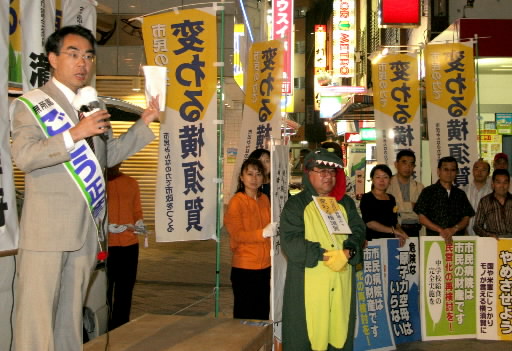Nuclear weapons can be eliminated: Chapter 6, Part 4
Jul. 29, 2009
Chapter 6: Instability in Northeast Asia
Part 4: Non-nuclear principles
by Keisuke Yoshihara and Junichiro Hayashi, Staff Writers
National policy comes under scrutiny in Japan and South Korea
Just before 8 p.m. on the last Saturday in June on the eve of the mayoral election in Yokosuka in Kanagawa Prefecture, candidate Masahiko Goto took to the streets to issue a plea. Surrounded by supporters Mr. Goto, 49, a lawyer who is unaffiliated with any political party, said, “We don’t need a dangerous nuclear aircraft carrier in Yokosuka! We have the right to complain to the government and the U.S. military!”
In October 1953, a few months after the ceasefire in the Korean War, the U.S. Navy aircraft carrier USS Oriskany called at Yokosuka, thus making the city known as the port at which a ship carrying nuclear weapons entered Japan for the first time. This was 14 years before Prime Minister Eisaku Sato’s 1967 declaration of Japan’s three non-nuclear principles: Japan shall neither possess nor manufacture nuclear weapons nor permit their introduction into Japanese territory.
In 1991 the U.S. declared that it would remove tactical nuclear weapons from its warships. Since that time the issue of the introduction of nuclear weapons into Japanese territory has seldom been raised in Yokosuka’s mayoral elections. But the stationing of a U.S. nuclear aircraft carrier in Yokosuka became an issue in the most recent election. Mr. Goto, who did not win the election, said, “Despite the fact the nuclear aircraft carrier is extremely dangerous, the government insists that it is safe. Yokosuka continues to be betrayed by the Foreign Ministry.”
The issue of betrayal was also raised about a month before the mayoral election in reference to the existence of a secret agreement between the U.S. and Japan for the introduction of nuclear weapons into the country. The government has continued to deny the existence of such an agreement, but former officials of the Foreign Ministry have repeatedly provided evidence that such an agreement exists. On July 10 Taro Kono, chairman of the Foreign Affairs Committee in the House of Representatives, also confirmed that there was such a pact, and the non-nuclear principles, which are national policy, are weakening.
South Korea also has four non-nuclear principles: 1) it will neither develop nor possess nuclear weapons, 2) principles shall be upheld with transparency, 3) all international rules regarding nuclear non-proliferation shall be followed, and 4) the peaceful use of nuclear energy shall be expanded. The principles were announced by the government in 2004 after it was revealed that a small amount of uranium had been enriched in an experiment at a national laboratory.
In December 1991, South Korea and North Korea signed a Joint Declaration on the Denuclearization of the Korean Peninsula. This declaration, which prohibited the manufacture, testing and use of nuclear weapons as well as uranium enrichment, is still in effect.
But North Korea, which is believed to have proposed the declaration, openly violated it in October 2006 and again in May of this year by conducting nuclear tests as well as in June when it announced that it had begun a uranium enrichment program.
“These violations by North Korea are intolerable,” Chough Soon-hyung, 74, a member of the National Assembly representing the opposition Liberal Forward Party, said angrily. “We may as well consider debating whether South Korea should acquire nuclear arms itself.”
Even though principles and declarations regarding nuclear weapons are national policy, they are neither laws nor treaties, and the guarantee of their effectiveness tends to be left up to the parties concerned. Both Japan and South Korea face the question of whether to strengthen these policies by signing them into law or whether to allow them to be chipped away at and to permit coexistence with nuclear weapons.
(Originally published on July 14, 2009)
To comment on this article, please click the link below. Comments will be moderated and posted in a timely fashion. Comments may also appear in the Chugoku Shimbun newspaper.








